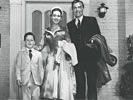Eye For Film >> Movies >> Bigger Than Life (1956) Film Review
Considered a routine domestic thriller when it came out, Jean-Luc Godard and François Truffaut in Paris hailed it as a film of rare importance. Nicholas Ray had made Rebel Without A Cause a year earlier, with James Dean, and already was being lionized by the aficionados of Cahiers Du Cinema as a director of genius. Bigger Than Life is another story of dysfunction, this time related to a mind altering medication, rather than teenage angst, shot in beautiful colour and wide screen CinemaScope.
Based on a real case of drug abuse and produced by James Mason, who plays Ed Avery, the small town teacher whose life is saved and almost destroyed by cortisone, it has a prophetic edge to it. While exposing, even mocking, the innate dullness of the I Like Ike paternalism of the Fifties, before rock’n’roll and feminism changed the world forever, it rides the wave created by The Man With The Golden Arm (1955).

Ray is careful not to go cold turkey, as Sinatra did in Preminger’s film, or melodramatise Ed’s addiction with hallucinatory dream sequences. Ed’s family – wife Lou (Barbara Rush) and son Richie (Christopher Olsen) – becomes the focus as well as the victim of his illness.
Ed starts having blackouts and his doctor (Robert F Simon) diagnoses a potentially fatal disease of the arteries for which he prescribes cortisone. Although successful in reprieving Ed’s death sentence, the side-effects of this new wonder drug, as it was then, prove delusional and dangerous. Ed’s character changes. He becomes paranoid, aggressive, insensitive to the feelings of others, a Mr Hyde to his once respected Mr Nice Guy.
At home, Lou has to keep up appearances for Richie’s sake as well as the neighbours, but increasingly fears for her son’s safety as Ed makes more and more demands on him. Her friend and confidant is Ed’s colleague Wally (Walter Matthau), who is more than willing to act as her protector. If this was a 21st century story, the sexual frisson between these two would be accentuated, even consummated, and the horror of Demonic Dad given the full Wes Craven.
Within the framework of moral rectitude that shields indiscretion behind lace curtained conformity, secrets fester. Ed moonlights with a cab company to boost his meager teacher’s pay, but does not tell Lou because of the implication of social stigma. Similarly, she remains loyal to Ed, even in his manic phase, rather than incite local gossip.
The performances are delicately balanced. Mason insinuates madness without loosening his bow tie and Rush internalises desperation without breaking the crockery. Ray’s control of the script is admirable. The only weakness is the final scene, which lacks conviction and feels made to order for the studio.
Reviewed on: 15 Aug 2007



















